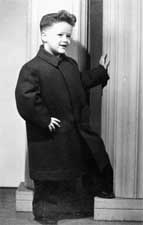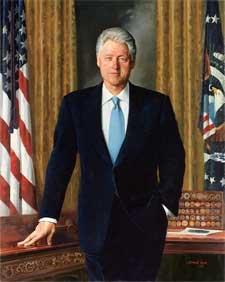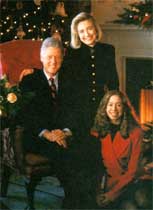William Jefferson Clinton is the forty-second President of the United States 1993-2001. At 46 he was the second youngest person elected to that office.

 Bill Clinton was born on August 19, 1946, in Hope, Bill Clinton was born on August 19, 1946, in Hope,
Arkansas, as William Jefferson Blythe III. His father died
in an auto accident before he was born, and when his mother remarried, Bill took on the last name of his stepfather.
After high school, Clinton studied at Georgetown University in Washington, DC (1964-68). Winning a Rhodes scholarship in his senior year, he went on to Oxford University in England
for two years. In 1970, he returned to the United States and won a scholarship to Yale Law School, where he supported himself with odd jobs and met Hillary Rodham. In 1975, they married.

Clinton served briefly as a law professor on the faculty of the University of Arkansas. As a young man, Clinton had gained experience working on several political campaigns, including that of George McGovern, and in 1974, he made his first bid for office, running for a Congressional seat in the US House of Representatives. Clinton lost, but the race was so close that it helped him get the necessary acclaim to win the 1976 Attorney General's race. In this position he fought rate increases by public utilities, stood against the construction of a coal-burning power plant and, in general, promoted tougher laws to protect the environment and the rights of consumers.
In 1978 he ran a successful bid for Governor of Arkansas, and at thirty-two, was the youngest Governor in Arkansas history. During this first term, Clinton alienated several important factions of Arkansas society. In attempt to upgrade Arkansas' roads, which ranked among the worst in the country, Clinton levied taxes on car owners. His opposition to the clear-cutting of trees lost him the support of the lumber and paper industries. He alienated the banking industry by penalizing those institutions that did not lend money to smaller businesses that would create jobs in their communities.
In 1980 he was defeated for Governor by a former Democrat who had switched parties just so he could run against Clinton. In the following election, Clinton ran again, and this time was victorious. He was elected three more times. During his tenure as Governor of Arkansas, one of Clinton's priorities was education. The dropout rate fell and the number of young people from Arkansas who entered college began to rise.

 In 1991, Clinton announced his candidacy for President. He campaigned for a national health care system, a tax cut for the middle class, a reduction of the deficit, and a new welfare system. Although during the campaign he was confronted by questions about his character, he proved adept at reconciling the conservative and liberal wings of the Democratic Party. He chose Al Gore of Tennessee as his running mate. Together they defeated incumbent George Bush and third party candidate, Ross Perot in the election of 1992. It is considered to be the presence of the third Party candidate, Perot that allowed Clinton to win with forty-six percent of the popular vote, the third smallest percentage that ever put a man in the White House. In 1991, Clinton announced his candidacy for President. He campaigned for a national health care system, a tax cut for the middle class, a reduction of the deficit, and a new welfare system. Although during the campaign he was confronted by questions about his character, he proved adept at reconciling the conservative and liberal wings of the Democratic Party. He chose Al Gore of Tennessee as his running mate. Together they defeated incumbent George Bush and third party candidate, Ross Perot in the election of 1992. It is considered to be the presence of the third Party candidate, Perot that allowed Clinton to win with forty-six percent of the popular vote, the third smallest percentage that ever put a man in the White House.
In his first term, Clinton appointed more women and minorities to the cabinet and as heads of major governmental departments than had any previous President. One of Clinton's major campaign issues had been health care, and First Lady, Hillary Clinton, chaired the administration's task force that examined and proposed changes in the United States health care system. That effort was unsuccessful, but Clinton's first major piece of legislation, a family leave bill that forced companies with more than fifty workers to allow twelve weeks of unpaid leave a year to cope with family issues, such as childbirth and illness, scored a big hit with the public.
During his campaign, Clinton had spoken of promoting equal rights for homosexuals. When the issue of gays in the military arose, Clinton was seen to waffle on this promise, compromising on a position that became known as the "don't ask, don't tell" policy. Among Clinton's first term successes were major trade legislation; a national service program, which provided funds for education to students in exchange for community service; and the so-called Brady Bill, named after Ronald Reagan's press secretary who'd been disabled on an assassination attempt against Reagan, which made it more difficult to buy handguns. His anti-crime law extended the use of the death penalty, banned the sale of assault weapons, and gave the states money to hire 100,000 more police officers and start community-based crime prevention programs.
 The 1994 Congress was predominantly Republican. The relationship between the executive and legislative branches of government was rocky, although Clinton did get bipartisan party support for the North American Free Trade Agreement. Clinton was the first President to use the Line Item Veto. He sent troops to Bosnia to enforce a truce; and sent troops to Somalia to distribute food to starving people. He also signed the General Agreement for Tariff and Trade to reduce tariffs and improve trade with European nations. He helped negotiate a peace plan between the Palestine Liberation Organization and Israel to allow Palestinian free government in the Gaza Strip. He was instrumental in returning a democratic government to Haiti. He was also instrumental in peace talks between Israel and the Palestine Liberation Front. The 1994 Congress was predominantly Republican. The relationship between the executive and legislative branches of government was rocky, although Clinton did get bipartisan party support for the North American Free Trade Agreement. Clinton was the first President to use the Line Item Veto. He sent troops to Bosnia to enforce a truce; and sent troops to Somalia to distribute food to starving people. He also signed the General Agreement for Tariff and Trade to reduce tariffs and improve trade with European nations. He helped negotiate a peace plan between the Palestine Liberation Organization and Israel to allow Palestinian free government in the Gaza Strip. He was instrumental in returning a democratic government to Haiti. He was also instrumental in peace talks between Israel and the Palestine Liberation Front.
Clinton was reelected in 1996, defeating Republican challenger Bob Dole and Reform party candidate Ross Perot. The strong economy and a weak effort by Bob Dole contributed to his victory.
Much of Bill Clinton's effectiveness as President was, however, overshadowed by scandal. His political opponents raised questions about a land deal he and his wife had been involved in some twenty years earlier, that involved the possibility of kickbacks and fraud. This became known as the Whitewater Affair. In addition, in 1994, a former employee, Paula Jones, accused him of sexual harassment. Personal friends of the Clintons have been convicted of fraud and involvement in Whitewater. Congress hired Special Prosecutor Kenneth Starr to investigate President Clinton.
The US House of Representatives brought two articles of impeachment against him over an sexual encounter with an intern named Monica Lewinsky and the question as to whether President Clinton perjured himself while answering questions about this affair. Clinton became the first President to be impeached since Andrew Johnson. Clinton was acquitted of the charges by the US Senate in 1999.
|

